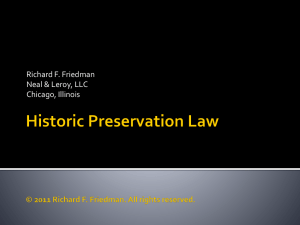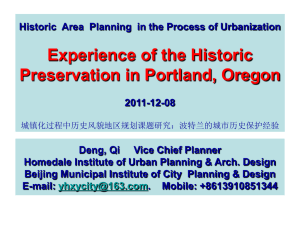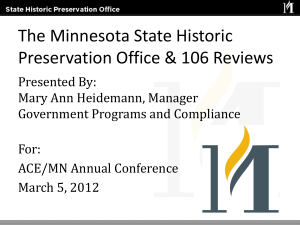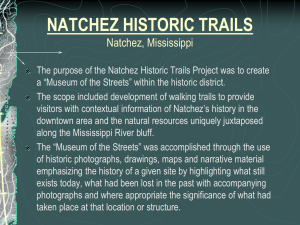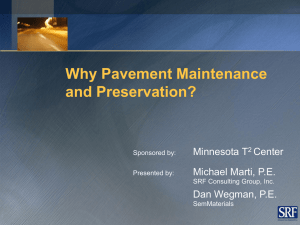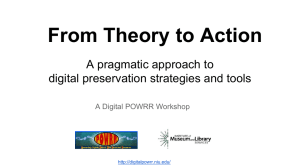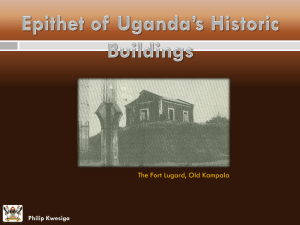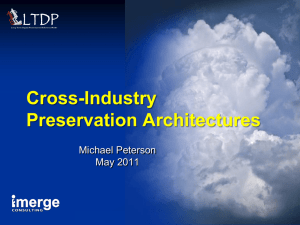What is AAHP? - The Alaska Association for Historic Preservation
advertisement
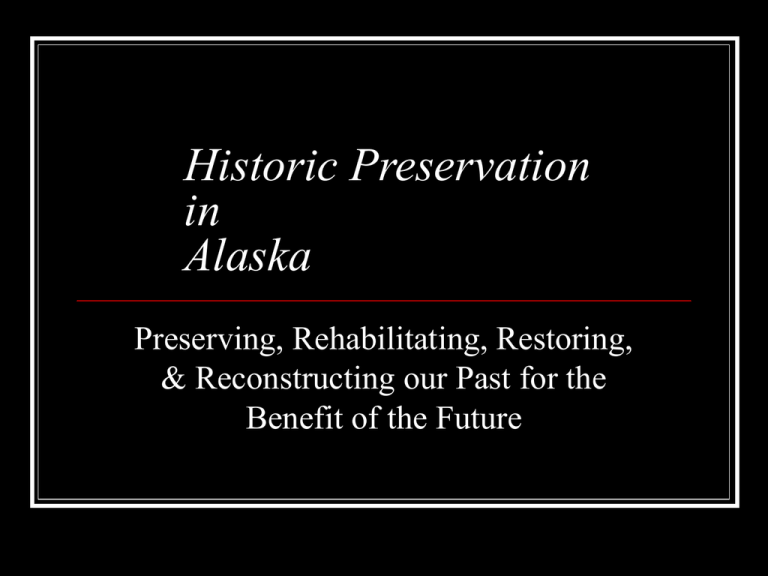
Historic Preservation in Alaska Preserving, Rehabilitating, Restoring, & Reconstructing our Past for the Benefit of the Future What is AAHP? AAHP was incorporated as a 501(c)(3) non-profit organization in 1982. AAHP is dedicated to the preservation of Alaska’s prehistoric and historic resources. Historic Preservation provides a vital link and visible reminder of the past, emphasizing the continuity and diversity of Alaska. What does AAHP do? AAHP aids in historic preservation projects across Alaska and monitors and supports legislation to promote historic preservation, serving as a liaison between local, statewide, and national historic preservation groups (NTHP). AAHP also publishes a quarterly newsletter and holds educational workshops for the public and historic preservation professionals. AAHP has ten members on its Board of Directors They are Architects, Historians, Art Historians, Archaeologists, and educators AAHP has over 100 active members from all over the country Who does AAHP assist? AAHP partners with and advocates for local non-profit historic preservation organizations, such as the Iditarod Historic Trail Alliance, the Friends of Nike Site Summit, and community-based historical societies. How can AAHP help? AAHP serves as a consulting party for the Section 106 process. AAHP also manages Alaska’s Ten Most Endangered Historic Properties Grant Program. AAHP annually gives out an Individual Lifetime Achievement Award and an award for outstanding work in historic preservation. Who is AAHP affiliated with? AAHP is the statewide partner of the National Trust for Historic Preservation in Alaska and is also a member of the Coalition for Full Permanent Funding of the Historic Preservation Fund. What is the National Trust for Historic Preservation? The National Trust for Historic Preservation is a national, privately funded non-profit organization supported by more than 250,000 members. For 60 years, they have helped people protect, enhance and enjoy the places that matter to them. Preservation has an important role to play in community revitalization, urban planning, rural and public lands policy, and much more. What is the Section 106 Process? It is the “review of any project funded, licensed, permitted, or assisted by the federal government for impact on significant historic properties. The agencies must allow the State Historic Preservation Officer and the Advisory Council on Historic Preservation, a federal agency, to comment on a project. The Alaska Historic Preservation Act contains a provision similar to Section 106 which mandates that any project with state involvement be reviewed in a similar manner.” Courtesy of the Alaska Department of Natural Resources, Division of Parks and Outdoor Recreation, Office of History and Archaeology website What is the Coalition for Full Permanent Funding of the Historic Preservation Fund? The Coalition for Full and Permanent Funding for the Historic Preservation Fund is comprised of national, statewide, tribal, and local organizations and agencies, and businesses who support securing full permanent funding for the Historic Preservation Fund. The HPF was established by Congress in 1976 and modeled after the Land and Water Conservation Fund. The HPF provides dedicated funds to support the programs and activities identified in the National Historic Preservation Act. Programs that recently received funding include the State Historic Preservation Offices, Tribal Historic Preservation Offices, and grant programs such as Save America's Treasures and Preserve America. Although the HPF is authorized at $150 million annually, Congress typically only appropriates one-third to one-half of that amount each year. What is the Ten Most Endangered Historic Properties Program? AAHP identifies Alaska’s ten most endangered historic properties each year in an effort to increase public awareness, and advocacy for, those properties. The list is announced each year in May, nationally recognized as Historic Preservation Month. AAHP administers a matching grant program in conjunction with the Ten Most Endangered List. AAHP’s Ten Most Endangered Grant Individuals or organizations whose historic properties are named to the Ten Most Endangered List in a given year are eligible to apply for assistance with preservation projects planned for the following year. Grants are distributed for use in stabilization, pre-construction, or construction activities focused on the preservation of endangered properties. This program is modeled after the NTHP’s 11 Most Endangered Grant. NTHP’S 11 Most Endangered 2010 America's State Parks & State-Owned Historic Sites Black Mountain, Kentucky Hinchliffe Stadium, New Jersey Industrial Arts Building, Nebraska Juana Briones House, California Merritt Parkway, Connecticut Metropolitan AME Church, Washington, DC Pågat, Guam Saugatuck Dunes, Michigan Threefoot Building, Mississippi Wilderness Battlefield, Virginia AAHP’s Nominated Ten Most Endangered 2010 Battery Magazine (402) – Dutch Harbor NHL Churchill/Cotter Homestead Cabin – Palmer Chief Kashakes House – Saxman Totem Row – Saxman Inlet Trading Post – Homer Colony Project Warehouse – Palmer Totem Square – Sitka Sage Building – Sheldon Jackson College – Sitka Alaska Native Brotherhood Hall – Sitka AAHP’s 2009 Ten Most Endangered Historic Properties Community Hall, St. George Island Holy Assumption Orthodox Church, Kenai Attu Battlefield St. Nicholas Orthodox Church, Juneau Wireless Transmitter Site, Government Hill Eagle Historic District Colony Project Warehouse, Palmer 4th Avenue Theatre, Anchorage Victor Holm Homestead, Kasilof Sheldon Jackson College, Sitka AAHP’s 2009 Grant Winner St. Nicholas Orthodox Church, Juneau Matching grant award of $4000 will help stabilize the foundation and (hopefully) restore the belfry Work to be done! Work to be done! How do we approach preservation? AAHP incorporates the philosophies of the National Trust for Historic Preservation along with technical guidance of the National Park Service and the State Historic Preservation Office to evaluate each building or site individually for the best possible approach to interpreting that building or site. Four approaches to preservation most commonly used are: Preservation Rehabilitation Restoration Reconstruction HOMEWORK! Rehabilitation or Restoration? What do we preserve? Preservation is NOT just about protecting buildings! Archaeological sites, oral histories, art, clothing, music, literature, film; all things made by man can be preserved (or conserved) for posterity, if it is deemed SIGNIFICANT as representing the human social fabric. What do YOU hope to preserve? Culture? Architecture? Art? Military History? Textiles? History of Transportation? Aboriginal Skills? History of Government? Or the Recent Past? Geneaology? Tribal History? History of Education? What can YOU do? We all bring our own interpretations of what should be preserved, and why. What we all DO have in common, however, is that we all hope to continue our traditions into the future, or at least have them remembered, after we are gone. There are many tools and resources available to achieve this today, taking many different forms. I hope I helped you understand some of them today, if you were not already aware of them. Thank you for your time! All images courtesy of… The Anchorage Museum of History and Art The Alaska State Library Collection (VILDA) UA’s Museum of the North The Seward Community Library Association The University of Alaska Archives and Manuscripts Department Alaska State Museum, Juneau

